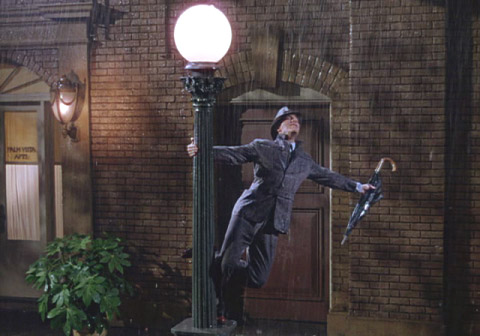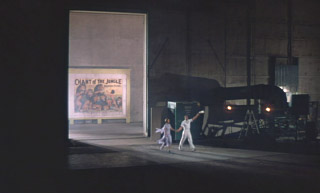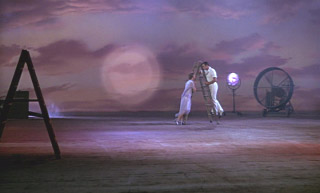|
When I lived in Europe, my everyday colleagues were bright young men in their twenties and thirties. Working together for long days, sometimes living together in small towns as a task force sent from HQ, we had plenty of time to ruminate about the differences between our cultures. Needless to say, I was curious about their opinions of Hollywood, and I'd always ask about their favorite English-language movies. Two films were always mentioned. Not Star Wars and The Godfather, but Singin' in the Rain and The Life of Brian. I've spent a lot of years trying to figure out why those two films are so popular outside the USA, and I'm still not sure I get it. In the case of The Life of Brian, from the English Monty Python troupe, the film was not popular in the States. In fact it was decidedly unpopular in the sense that Christian groups seemed to make "Brian is sacrilegious" into a pan-religious mantra. The film did well with intellectuals and the college crowd, but never reached the heart of mainstream America. I guess the film's extreme cult status in Europe shows that the heart of mainstream Europe is significantly different. The European approach is to ridicule all institutions, and they consider religion to be one of the most pernicious targets. America has plenty of people who feel the same way, but at its heart the United States is probably the most vocally religious of any of the developed nations. I know of nothing significant in Europe which compares to the strain of religious fundamentalism that pervades American culture - the TV preachers, the Church interference in the arts, the citing of God to justify policy, the politicians and leaders who wear religious belief as a badge of honor. Europeans may be as religious (although I doubt it), but they view religion as more of a matter of personal belief, less a matter of showmanship. I once said in those late-night conversations a decade ago, as a 40ish American trying to describe his culture to 25ish Europeans, that we in America generally avoid discussing religion, sex, and politics in drunken postprandial family talk. One of the European women once asked me "what else is there?" Not a bad question, when you get down to it. I suppose one of the reasons drunken Americans don't discuss religion and politics is that fistfights inevitably ensue. Europeans aren't so much into that whole cowboy thing. The concepts in The Life of Brian are exactly the sorts of things that Europeans do laugh about and debate with their families at the dinner table, and that movie seems tuned into their zeitgeist. As for Singin' in the Rain, if I understand what the young Swedes and Dutchmen told me, it is "just so perfectly American". It is a movie made by Hollywood about Hollywood. It is America showing the world how it views itself. To view Singin' in the Rain is to understand some things about America that can't otherwise be imagined by young Europeans. "How do you Americans get this carefree air about you?", they would ask me, and I'd realize that we Yanks don't really have a Tarkovsky or a Strindberg in our midst, a great dour genius brooding publicly about the insanity of the human condition. The closest we come is Ralph Nader, who falls more under the rubric of "quibbling" than "brooding". In the arts, our concept of a heavy thinker, our Ingmar Bergman, our ersatz Kierkegaard and proxy Kafka, is Woody Allen, who insists on salting every profound thought with several wisecracks Assume an unfixable problem. Europeans would die of grief brooding about it. Americans would die of strain trying to fix it. Fuck thinkin'. Let's DO something and make some jokes about it if we fail. Singin' in the Rain has that "carefree air". The very title says it all. We don't write sad poems about rainy days. We go outside and sing, and we drop the "g" at the end of "singing" while we're at it. Europeans find this element of the American character to be fascinating and incomprehensible. The may also say they find it contemptible but in a very profound and secret way which they will rarely admit, they envy it as well. "Are you Americans really so interested in the lives of celebrities?", they would ask me. Yes, we are, for better or worse. This is a behavior pattern completely incomprehensible to many non-Americans, and even to American intellectuals, who view it as a shallow surrendering of our lives to vicarious pleasures in lieu of real ones. Singin' in the Rain is about our obsession with celebrity, and the extent to which we will go to obtain it, be near it, and retain it. |
|
|
It was the last of the truly great musical comedies. The musical drama format (Cabaret and West Side Story, e.g.) would completely replace the zany comedies within a few years. In just a few more years after that, musicals would be irrelevant altogether, hanging on solely because of Andrew Lloyd Webber, who transformed musical plays into some form of upper-middlebrow latter-day operas, completely drained of the populist energy and exuberance they once had. Maybe that is also true of America itself. The quintessentially American movie, Singin' in the Rain, originally won no Oscars in a year in which a dreadful circus movie was Best Picture. Yet people hold the film's image of Gene Kelly in their minds forever. If I were to choose one image that sums up all of American cinema in the 20th century, perhaps all of American culture in the 20th century, it would be the one to the right. |
|
|
If you aren't aware of the plot, it is basically this: A noted silent screen couple must make the transition to talkies when 1929 rolls around.
Of course, there is the obligatory love story as well. The leading man (Gene Kelly) is not really in love with his screen flame (Jean Hagen). That is a pairing imagined by the studio publicity department. He does, however, fall in love with the woman who dubs the star's voice (Debbie Reynolds). Silliness ensues. |
|



